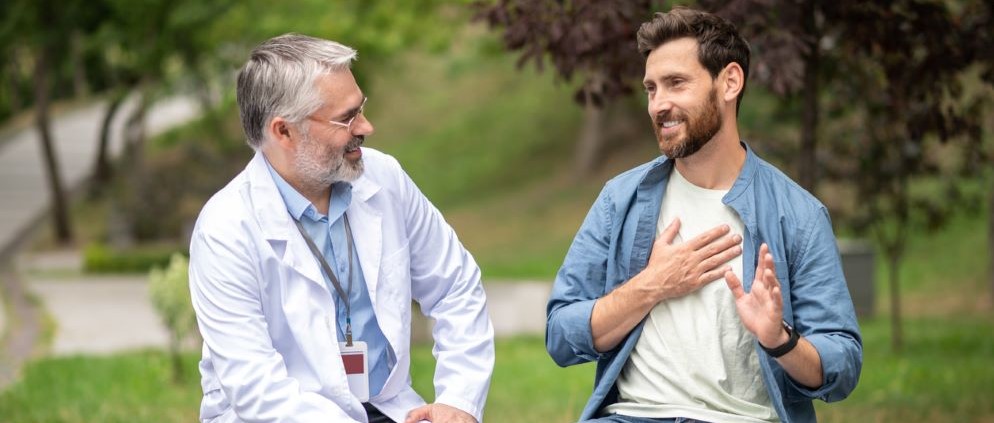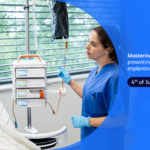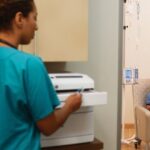Climate change effects on health: You have a role to play
When we think about climate change, the first things that spring to mind are polar bears, melting icecaps and bleached coral reefs. But are you also aware that climate change effects are predicted to be the biggest threat to human health this century?1 Indeed, according to the World Health Organisation (WHO), rising temperatures have the potential to reverse, ‘decades of health progress.’2
Our current reliance on fossil fuels means that we are looking at a ‘catastrophic’ increase in global temperatures of 2.7oC by the end of the century.3 Perhaps shockingly, the health sector is a part of the problem. Globally, the healthcare sector is responsible for approximately 5% of greenhouse gas emissions and this figure rises to 10% for the United States. 3,4
Direct and indirect climate change effects
Impact to human health from climate change is both direct and indirect: for example, heatwaves can cause heart attacks, kidney disease and cardio-respiratory diseases; while indirect effects include reduced access to food due to poor crop yields resulting in malnutrition.1
Here are some additional facts to help you contextualise:
- Heat related deaths increased by 68% between 2000-2004 and 2017-2021 with air pollution and the subsequent burden of disease recognised as ‘substantial’ 3
- The emergence and spread of infectious disease is facilitated by the changing climate 3
- More people are facing the prospect of undernutrition due to food insecurity caused by climate change3
- WHO predicts that between 2030 and 2050, climate change will directly cause the death of 250,000 people from malaria, diarrhoea, heat and lack of proper nutrition2
The consequences to the global healthcare systems will be twofold:1
- Externally, there will be greater demand for services as more people suffer ill health
- Internally, the normal working order will be placed under strain with issues such as supply chain disruption
What can you do about climate change effects on health?
A substantial report in The Lancet on the topic of health and climate change states, ‘A health-centred response would reduce the likelihood of the most catastrophic climate change impacts [while] offering immediate health benefits.’3
By focusing on health and wellbeing, countries could swiftly move away from fossil fuels in order to make the transition to renewable energy sources.3
As a healthcare professional (HCP), you have the opportunity to serve as a spokesperson on climate action:1
- Linking health to climate change has, ‘considerable potential to heighten public engagement […] and build public support’ for measures to address the issue5
- HCPs are considered ‘trusted voices’ 5
Start now
While at first it may seem daunting, as an HCP you can make a difference. You can help protect your healthcare system and reduce the impact of climate change effects on health. We suggest that you start small and build from there. First consider your own practice. For example, grab any opportunity to talk to colleagues and patients about the impact of climate change on health. This toolkit from WHO gives great tips on how and when to communicate effectively.
Consider how to introduce environmentally friendly practice to your immediate working space to help reduce environmental harm. How about setting up a recycling programme for used syringes? You can easily find tips from reputable sources on the internet. Here are just two examples from BD IV News – How to set up a syringe recycling programme – BD IV News and The ins and outs of syringe waste disposal – BD IV News
Explore how efficiencies may be introduced into your healthcare facility.6 Improved workflows and reduced waste can support environmental sustainability.6 Then, you can start to think bigger. An editorial of the Journal of Climate Change and Health explains how you may reach further into your workplace and community.6
You are in a strong position to:6
- Lead – within healthcare institutions, while acting as a role model for other sectors
- Educate – about the urgency of climate change and its impact on health
- Advocate – for decisions that address climate change
- Research – use the scientific approach to raise awareness and to seek answers to problems
So why not start today? Small steps can become strides towards a healthier future.
References
- World Health Organisation (WHO). Communicating on climate change and health: toolkit for health professionals; 2024.
- World Health Organisation (WHO). Climate change. Published 12 October 2023. Accessed 24 April 2024 at https://www.who.int/news-room/fact-sheets/detail/climate-change-and-health
- Romanello M, Di Napoli C, Drummond P, et al. The 2022 report of the Lancet Countdown on health and climate change: health at the mercy of fossil fuels. Lancet. 2022;400(10363):1619-1654.
- Neal R. Ways and Means Committee 2022, Health Care and the Climate Crisis. Published 2022. Accessed 24 April 2024 at: https://democrats-waysandmeans.house.gov/health-care-and-climate-crisis-preparing-americas-health-care-infrastructure
- Uppalapati, SS, Campbell, E, Kotcher, J, Maibach EW. Public and Health Professional Engagement with Climate Change as a Health Issue: A Review of the Literature. George Mason University. Updated 28 August 2023. Accessed 21 May 2024 at https://papers.ssrn.com/sol3/papers.cfm?abstract_id=4536308
- Duhaime, AC, Futernick M, Alexander M, et al. Healthcare professionals need to be CCLEAR: Climate collaborators, leaders, educators, advocates, and researchers. Journal of Climate Change and Health. 2021;4(5):100078.
This list of references to third-party peer-reviewed material and the sites they are hosted on are provided for your reference and convenience only, and do not imply any review or endorsement of the material or any association with their operators. The Third-Party References (and the Web sites to which they link) may contain information that is inaccurate, incomplete, or outdated. Your access and use of the Third Party Sites (and any Web sites to which they link) is solely at your own risk.
BD-124880




